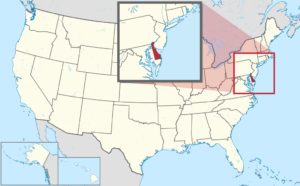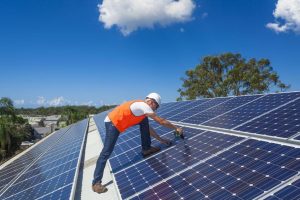 Delaware is the first state in the United States. It is located on the cusp of the Atlantic. It is a state filled with much American history and natural beauty.
Delaware is the first state in the United States. It is located on the cusp of the Atlantic. It is a state filled with much American history and natural beauty.
Delaware is among the few states leading the frontline towards a greener future with policies allowing easy access to solar PV systems. Going solar is a fantastic way to save some serious cash on utility bills.
Going green by taking advantage of the sun will help protect the natural beauty of Delaware.
Currently, only 11% of the electricity is produced through renewable means. This means that 89% of it is made using other means, including fossil fuel burning. Burning fossil fuels releases carbon into the atmosphere, which is a pollutant. Over the years, this carbon accumulation in the atmosphere has led to a climate disaster known as global warming.
A 5 kW system is enough for an average household to meet the power needs. The average price of a 5 kW system in Delaware is $25,000. The payback period for that solar investment is 8-9 years. All tax credits cut. The payback period is measured by dividing the solar system’s initial cost by the savings you will get after you stop paying for electricity.
The short payback period is attributed to the expensive electricity costs. Consumers in Delaware are charged $0.14 per kilowatt-hour. This is slightly above the national average. You can save up to as much as $800 in the first year after installation of solar panels in Delaware.
The benefit of solar PV is that it starts generating electricity immediately after installation, generating your savings right from the onset.
Delaware has great policies and utility rebates encouraging homeowners to invest in solar energy. Here are the various solar panel laws in Delaware.
Contents
- 1 Key Takeaways
- 2 Delaware Renewable Portfolio Standard (RPS)
- 3 Net Metering In Delaware
- 4 Federal Solar Tax Credit
- 5 Delaware Tax Exemptions
- 6 Case Study: Residential Solar Installation Delaware
- 7 Expert Insights From Our Solar Panel Installers About Solar Panel Laws in Delaware
- 8 Experience Solar Excellence with Us!
Key Takeaways
- Delaware encourages solar panel adoption with policies that make it easy for homeowners to acquire solar PV systems, offering potential savings on utility bills while helping protect the environment.
- Delaware’s Renewable Portfolio Standard (RPS) requires utilities to produce 25% of their electricity from renewable sources, leading to lucrative rebates for homeowners who upgrade to solar panels.
- Homeowners in Delaware can benefit from net metering, federal solar tax credits, and sales tax exemptions, making solar power more affordable and financially rewarding.
Delaware Renewable Portfolio Standard (RPS)
Delaware has passed an RPS requiring that all utilities produce 25% of their electricity using renewable means. This is good for homeowners as utilities count energy from residential solar as part of their targets. This means that utilities will offer lucrative rebates to encourage homeowners to upgrade to solar.

Net Metering In Delaware
Net metering is available to residents of Delaware. Net metering is a system that allows homeowners who have installed solar PV systems to use a grid-like battery. This will enable utilities to monitor the electricity that you produce and how much you consume.
When your solar panel produces more energy than you require for your household, the grid adopts the extra energy to power up another area.
When you send energy to the grid, you earn solar credits that you can use to offset your utility bill. When your solar panel isn’t producing enough energy to meet your household needs, i.e., during the winter season, you can draw energy from the grid to supplement your energy needs.
The bill is then netted off with the credits that you have accumulated.
The credits you earn can be rolled over to subsequent months if you don’t use them.
After twelve months, you can request to be compensated financially for the credits you earn. The utility providers should compensate you for credits earned at full retail price. Knowing that the law doesn’t force utilities to comply with this directive is important.
The state of Delaware also offers Solar Renewable Energy Credits (SREC). Utility providers give these certificates for achieving a certain level of energy production that you send to the grid. These certificates can then be returned to the utility provider for financial gain.
You are granted one SREC when you produce one Megawatt of electricity. The price of one SREC can vary from $150 per SREC to $500/SREC, depending on the time you sell them.
Federal Solar Tax Credit
It is commonly known as the Investment Tax Credit (ITC). It is an incentive that the government formulated to favor homeowners’ adoption of solar power.
This scheme allows you to deduct 30% of your Solar PV system’s total cost from the taxes you owe the government. This means you receive a tax cut just for buying a solar PV system.
The system’s total cost includes the solar panels, installation fee, and other auxiliary components. If your installation costs you $20,000, your federal tax credit will be $5,200. You can deduct this amount from the taxes that are due.
If you don’t pay enough taxes to recover the whole amount in a year, you can split the amount over subsequent years.
This incentive applies only to homeowners who buy a whole solar system at a go, either by cash or through a solar loan.
To achieve maximum savings from your solar system, buying the whole system in cash is recommended. If you are a bit low on funds, you can take a whole unit loan and use the tax cut to pay your loan’s first installments.

Delaware Tax Exemptions
Delaware does need a sales tax exemption as there’s no sales tax. This means that users in Delaware pay more for solar PV systems than those in other states. The elimination of sales tax means more savings for homeowners who switch to solar power.
There’s no property tax exemption in Delaware. You will have to pay for the value that the solar panel will increase for your household.
Case Study: Residential Solar Installation Delaware
Background
Solar Panels Network USA was approached by a homeowner in Middletown, Delaware, looking to reduce their high electricity bills and contribute to environmental sustainability. The client had heard about Delaware’s favorable solar panel laws, including the Renewable Portfolio Standard (RPS) and net metering, which encouraged them to invest in a solar PV system.
Project Overview
The project involved installing a 5 kW solar PV system on the roof of a single-family home. The main goal was to generate enough electricity to meet the household’s energy needs and to take advantage of the various financial incentives available in Delaware.
Implementation
Our team conducted an initial assessment to determine the optimal placement and configuration of the solar panels. We ensured that the installation would maximize sunlight exposure throughout the year. The installation process included:
- Design and Planning: Customizing the solar panel layout to fit the roof’s dimensions and ensuring compliance with local regulations.
- Installation: Installing the solar panels, inverter, and other necessary components with minimal disruption to the homeowner’s daily routine.
- Connection to the Grid: Setting up the net metering system, allowing the homeowner to earn solar credits for excess energy produced.
Results
Immediately after installation, the solar PV system began generating electricity. The homeowner noticed a significant reduction in their electricity bills, saving up to $800 in the first year alone. Additionally, the system’s excess energy production during peak sunlight hours was credited back to their account, further offsetting future energy costs.
Summary
This residential solar installation in Middletown, Delaware, demonstrates the practical benefits of going solar under Delaware’s supportive policies. The homeowner not only enjoyed substantial savings on their utility bills but also contributed to the state’s renewable energy targets. Solar Panels Network USA continues to support homeowners in navigating the financial and environmental benefits of solar energy, ensuring a sustainable future for all.
Expert Insights From Our Solar Panel Installers About Solar Panel Laws in Delaware
Understanding Delaware’s Renewable Portfolio Standard (RPS) is crucial for homeowners. By producing 25% of electricity from renewable sources, it creates a substantial incentive for solar panel installations. Homeowners can not only contribute to a greener future but also benefit from lucrative rebates.
Senior Solar Installer
Net metering in Delaware offers a fantastic opportunity for residents. The ability to earn solar credits and offset utility bills makes solar panels a financially sound investment. It’s a win-win situation for both the environment and the homeowner’s wallet.
Lead Technician
The Federal Solar Tax Credit is a game-changer. Deducting 30% of your solar system’s total cost from your taxes significantly reduces the financial burden. For anyone considering solar, this is an incentive that should not be overlooked.
Project Manager
Experience Solar Excellence with Us!
Trust in Solar Panels Network USA, where our seasoned experts deliver top-quality solar solutions for homes and businesses nationwide. With a legacy of countless successful installations and a commitment to sustainable energy, we’re your reliable partner in the solar journey. Ready for a brighter, eco-friendly future? Call us now at (855) 427-0058 and harness the power of the sun!
Map image by Wikimedia Commons User: TUBS / CC-BY-SA-3.0
About the Author
Solar Panels Network USA stands at the forefront of solar energy solutions, driven by a team of seasoned solar engineers and energy consultants. With over decades of experience in delivering high-quality solar installations and maintenance, we are committed to promoting sustainable energy through customer-centric, tailored solutions. Our articles reflect this commitment, crafted collaboratively by experts to provide accurate, up-to-date insights into solar technology, ensuring our readers are well-informed and empowered in their solar energy decisions.

